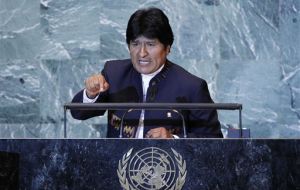MercoPress. South Atlantic News Agency
Latin American States at UN focus on financial crisis, suggest transaction tax
 “It’s a Security Council for whom?” asked Bolivia’s Evo Morales
“It’s a Security Council for whom?” asked Bolivia’s Evo Morales Blaming speculation for the high price of food and oil, and arrogance and greed for the global economic crisis, the Dominican Republic called Thursday at the United Nations for new market rules and proposed a 5% tax on financial transactions to spur growth and prosperity.
With 4 trillion dollars circulating every day untaxed around the world in financial transactions, such a tax would bring in 4.8 trillion annually, Dominican Republic President Leonel Fernández told the General Assembly on the second day of its 66th annual General Debate.
“Mr. President, 4.8 trillion would not only solve problems related to some countries’ sovereign debt but at the same time there would be enough fresh resources for investing, which would allow a rapid recovery from the current financial and economic world crisis,” he said.
If it was felt that this is not an appropriate way for States to collect income, he noted that more than 10 trillion deposited in tax havens, increasing by 600 billion each year, without a dime entering the tax department of any Government, he added.
“In sum, we are forced to accept an increasingly alarming situation of social injustice because of the indisputable and uncontrollable power held by a circle of the world economic elite,” he declared, singling out financial speculation in food and oil, which saw prices of soy, corn, rice and wheat increase by between 107 and 136% from 2006 to 2008, adding 150 million more people to those who go hungry around the world for a total of over 1 billion.
Citing international analysts for figures showing that 30 to 40% of increases for commodities are attributable to financial speculation on futures contracts, he called for limits on the volume of such insurance companies, investment banks, pension funds, and equity funds that are in no way involved in the physical handling of the product, along with an increase in deposit guarantees to disincentive speculative transactions that only contribute to price volatility.
The global financial crisis has been produced by “by a lack of clear rules in the international financial system, by arrogance, by greed, and by an uncontrolled eagerness for amassing wealth,” he said.
President Sebastián Piñera Echeñique of Chile noted the need for concerted action by the UN and other global bodies to deal with financial and other crises in an increasingly inter-connected world.
“For example, financial crisis, in addition to becoming more frequent, have increasing regional and global implications,” he told the Assembly. “The evils of modern society, such as terrorism, drug trafficking and organized crime, now know no frontiers, territories or jurisdictions.
“And any attempt to deal effectively with global warming, natural catastrophes, health emergencies, hunger and extreme poverty will require much more concerted and effective action by the community of nations and international bodies such as the United Nations, the World Bank, the IMF, the Group of 20, trade organizations and other global and regional bodies.”
In a separate meeting with Secretary Ban Ki-moon Mr. Piñera discussed the challenges of middle-income countries, such as income distribution, as well as access to education and health services for all. Mr. Ban recognized Chile’s important contribution to UN operations in Haiti.
President Ollanta Humala of Peru said that the risks looming over Latin American economies stem from problems originating in the United States, Europe and Asia, such as the high levels of public debt and unemployment.
“Latin American countries are learning to overcome the chronic vulnerability in the face of these crises,” he said in an address that touched on a host of issues ranging from coca cultivation and trans-national crime to strengthening democratic institutions and respecting indigenous peoples.
“We have decided to act in a concerted way, coordinating policies to strengthen our economic fundamentals and oversee our financial systems,” he added, stressing the commitment to integration and noting that Latin America is the region with the greatest inequality in the world.
Also touching on financial issues, Bolivia’s President Evo Morales called for the creation of alternative financial bodies. The IMF had shut off Bolivia’s access to international credit and placed conditions on loans, providing credits to transnational companies instead, he told the Assembly yesterday.
He also called for reform of the 15-member Security Council, where a small group of countries now decide on interventions. “It’s a Security Council for whom?” he asked. “It’s the insecurity council for the Presidents of people who seek cultural and social liberation and recovery of their economic resources.”
President Porfirio Lobo Sosa of Honduras said all sectors of his Central American country had been consulted on the creation of a national plan for equitable economic growth, salaries and productivity in the face of the global economic and financial crisis.
Widespread reform of the education system and the provision of equal opportunities had been made priorities, a family help programme hoped to reach about half of the country’s families by 2012, and a nutrition-assistance programme was also under way, he told the Assembly yesterday. As for sustainable development, Honduras was involved in shark-preservation programmes and had signed instruments on reducing global warming and controlling chemical products.
Piñera r concerted action by the UN and other global bodies to deal with financial and other crises in an increasingly inter-connected world.




Top Comments
Disclaimer & comment rulesCommenting for this story is now closed.
If you have a Facebook account, become a fan and comment on our Facebook Page!